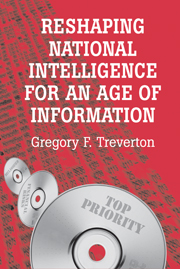Book contents
- Frontmatter
- Contents
- Foreword
- Preface
- Note on sources
- 1 The imperative of reshaping
- 2 The world of intelligence beyond 2010
- 3 The militarization of intelligence
- 4 Designated readers: the open source revolution
- 5 Spying, looking, and catching criminals
- 6 The intelligence of policy
- 7 A reshaped intelligence
- Index
1 - The imperative of reshaping
Published online by Cambridge University Press: 23 May 2010
- Frontmatter
- Contents
- Foreword
- Preface
- Note on sources
- 1 The imperative of reshaping
- 2 The world of intelligence beyond 2010
- 3 The militarization of intelligence
- 4 Designated readers: the open source revolution
- 5 Spying, looking, and catching criminals
- 6 The intelligence of policy
- 7 A reshaped intelligence
- Index
Summary
When India tested nuclear weapons in May 1998, and Pakistan quickly followed with tests of its own, Washington was immediately abuzz with the familiar bemoanings over the latest intelligence failure. Why hadn't the United States known in advance about the tests? George Tenet, the director of central intelligence (DCI), immediately set in motion an investigation, chaired by former vice chairman of the Joint Chiefs of Staff, Admiral David Jeremiah. Tenet himself admitted bluntly: “We did not get it right. Period.”
The case displayed all but one of the challenges that U.S. intelligence confronts. The exception is providing intelligence to support military operations around the world by the United States and its coalition partners. Known by its acronym, SMO, this support to military operations has become intelligence's primary new business in the world beyond the Cold War. In other respects, though, Jeremiah's report, which remains secret but whose conclusions were briefed publicly, echoes this book's themes. Intelligence is drifting, unsure of what it does and for whom. It remains mired in institutions, processes, and habits of mind that may have been appropriate to the Cold War but manifestly are not now. It badly needs to be radically reshaped for an age of information. This is a time to reexamine first principles, which are now open to question in a way they haven't been for a half century.
Most obviously, the United States didn't have a single spy worth his (or, less likely, her) salt in India, the Jeremiah report apparently concluded.
- Type
- Chapter
- Information
- Publisher: Cambridge University PressPrint publication year: 2001

